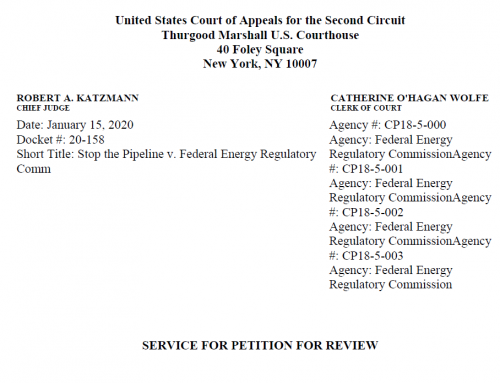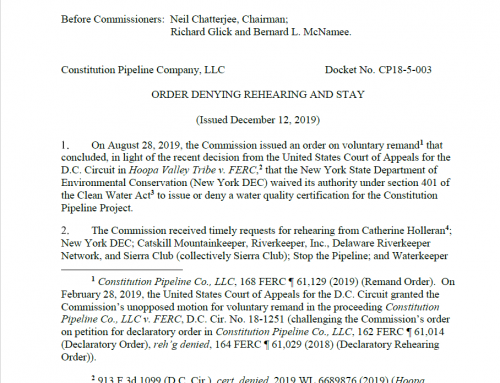FOR IMMEDIATE RELEASE
Media Contact: Anne Marie Garti (718) 601-9618
East Meredith, NY (February 24, 2020) – Eight years after the Constitution Pipeline Company, LLC announced its plans to construct a 125-mile-long pipeline from North Central Pennsylvania through the Southern Tier and Western Catskills of New York State, the Williams Company stated, with its partners’ agreement, that further development in the project was not warranted.
“Constitution’s investors just confirmed what we have been saying for the past eight years – there is no need for this project,” said Anne Marie Garti, a founding member of Stop the Pipeline (STP) and an attorney who represents the group. “In the end, the companies had to write off hundreds of millions of dollars they had wasted. This exposes the failure of the Federal Energy Regulatory Commission (FERC), which approves every pipeline application if it includes paper contracts, even if there is no evidence of the public’s need for the gas. Here FERC’s rubber-stamp enabled the taking of private property for a project that will be never constructed.”
STP, a grassroots organization formed in 2012, led the fight to stop the controversial Constitution Pipeline. While its members have diverse interests – from the violations of property rights to concerns about environmental impacts and climate change – STP focused on water quality impacts, an area where it could exert the most pressure during the complex regulatory review. After FERC approved the project in late 2014, STP encouraged the New York State Department of Environmental Conservation (NYSDEC) to deny a required water quality certification. STP filed expert reports and its members delivered well over 5,000 comments to NYSDEC. It then organized a coalition of regional groups and invited them to participate in two massive rallies in Albany. Its efforts paid off. In April 2016, NYSDEC denied the pipeline company’s application for a water quality certification.[1] However, property had already been taken from STP’s members through eminent domain. The latest news has given them hope.
“We are thrilled that this nightmare is ending and we have tears of joy in our eyes because David has, once again, conquered Goliath!” said Anne and Bob Stack, who had to set aside their plans to build a retirement home in the Western Catskills after they found out the pipeline would go near the site. The Stacks thanked STP for this turn of events. “This would never have happened if not for the unrelenting work of Anne Marie Garti and all of STP. Now, we need to reverse the eminent domain that FERC has imposed on us landowners.”
STP agrees that will be the next step. Hopefully, the Second Circuit will vacate FERC’s orders based on the arguments STP developed in its 2016 briefs, namely the violations of due process and the lack of evidence of need for the project. (STP v. FERC, Second Circuit Case No. 16-361.) That would enable landowners to ask the district courts to remove the court-ordered easements from their deeds. However, landowners will never be compensated for their suffering.
“The eight years of anguish and emotional struggle that we have endured will be forever etched in our souls,” said Dan and Laura Jean Brignoli. “However, this is not over until we are given back our land that was so wrongly taken from us. Having our land back will allow us to put a final closure on this bitter ordeal.”
STP also hopes that its victory will help others. Mark Pezzati, a long-time STP steering committee member, says, “We hope that our success stopping this pipeline will be a valuable learning experience and inspire others in similar predicaments across the U.S. to defend their own communities from the onslaught of a rogue fossil-fuel industry.”
###
[1] Constitution Pipeline Company challenged the denial a number of times and lost. See e.g. Constitution Pipeline Co., LLC v. N.Y. State Dep’t of Envtl. Conservation, 868 F.3d 87, 100, 103 (2d Cir. 2017), reh’g denied, cert. denied, 138 S.Ct. 1697 (2018). However, on August 28, 2019, FERC issued an order declaring that NYSDEC had waived its rights to issue the denial. FERC’s order is currently being challenged by three consolidated petitions in the Second Circuit, Case Nos. 19-4338, 20-158, 20-208.




